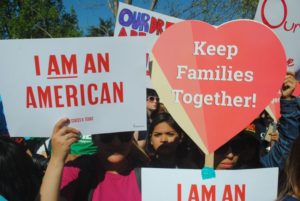
Yesterday the Supreme Court hit a tie decision on President Barack Obama’s immigration policy. The tie vote, on the United States v. Texas, No. 15-674 case, means the justices were unable to announce a ruling, so that leaves in place the lower court ruling against implementing the plan. In addition to shielding parents from deportation, the program, names the Deferred Action for Parents of Americans and Lawful Permanent Residents, or DAPA, would have granted similar protection and work permission to people brought to the country as children and without legal status.
Originally from Guatemala and now working as a housekeeper in Maryland, Maria De León was saddened by the court’s tie vote she also made clear she was not shaken. “I am so disappointed. I believed in the law and they really let us down,” said as she sobbed outside the Supreme Court. “We have to keep fighting now. I can’t vote in November, but you better believe that I will make sure that everyone I know who can vote does so in November. We have to come out from out of the shadows.”
De León’s three children were born in the U.S. and were with her at the Supreme Court. Because her children are U.S. citizens, she would have been eligible for Obama’s Deferred Action for Parents of Americans, or DAPA, one of the programs the Supreme Court had examined for its legality. Presumptive Demoratic nominee Hillary Clinton has said she’d expand Obama’s executive action and send to Congress an immigration reform bill in her first 100 days.
Like many families in the U.S., Hilaria Bonilla’s family is made up of people with varying immigrant status. Bonilla is a legal resident originally from El Salvador. “With this tie, the Supreme Court is showing us that they simply are not interested in helping us. Many of my family and my children can vote in November and they will send a message that this is not right. I am really disappointed,” Bonilla said.
Anxiety in the community has been ratcheting up this month as many immigrants have been anticipating the court’s decision on the case. But at the same time, there has been a recognition that there have been a string of ups and downs for immigrants in their fight for policies that would allow them to legally live in the U.S. The case originated last February in Texas when the state and 25 others sued to block the programs from being implemented. U.S. District Judge Andrew Hanen found that the administration had not followed proper government administrative procedures for launching the new programs and put them on hold.

Recent Comments